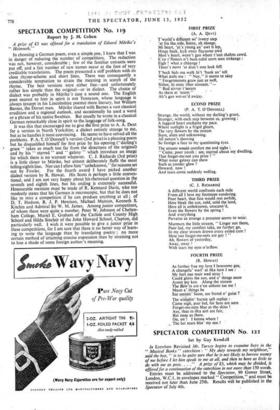SPECTATOR COMPETITION No. 119 Report by J. M. Cohen
A prize of £5 was offered for a translation of Eduard Morike's " Heimweh."
In choosing a German poem, even a simple pee, I knew that I was in danger of reducing the number of competitors. The reduction was not, however, considerable ; few of the familiar entrants- were put off, and a fair number of new names occur at the foot of very creditable translations. The poem presented a stiff problem with its close rhyme-scheme and short lines. There was consequently a considerable temptation to strain the meaning in search of the rhyme. The best versions were either free—and unfortunately rather less simple than the original—or in dialect. The choice of dialect was probably in Miirike's case a sound one. The English poet nearest to him in spirit is not Tennyson, whose language is . always (except in his Lincohnhire poems) more literary, but William Barnes, the Dorset man. Morike shared with Barnes a vast classical erudition and a regional outlook, and occasionally he used a word or a phrase of his native Swabian. But usually he wrote in a classical German remarkably close in spirit to the language of folk-song.
It was this that encouraged me to give the first prize to A. A. Dent for a version in North Yorkshire, a dialect entirely strange to me, but as he handles it most convincing. He seems to have solved all the problems. P. A. T. O'Donnell's version (2nd prize) is a pleasing poem but he disqualified himself for first prize by his opening ("darling's grace" takes us much too far from the directness of the original) and by his " starred " and " galaxy " which introduce an image for which there is no warrant whatever. C. J. Richards (3rd prize) is a little closer to Morike, but almost deliberately fluffs the most telling eighth line. Nor can I allow him "unbeknown," for reasons set out by Fowler. For the fourth award I have picked another dialect version by R. Howat. His Scots is perhaps a little conven- tional, and I am not very happy about his rhetorical question in the seventh and eighth lines, but his ending is extremely successful. Honourable mention must be made of R. Kennard Davis, who too modestly states that his German is microscopic, but that he doesnot like to miss a competition if he can produce anything at all ; of D. T. Hodson, R. J. P. Hewison, Michael Manton, Kenneth S. Kitchin and Admiral Sir W. M. James. Among junior competitors, of whom there were quite a number, Peter W. Johnson of Chelten- ham College, Muriel E. Graham of the Carlisle and County High School and Hilda Sinclair of the John Howard School, Clapton, did particularly well. I wish it were possible to give a junior prize in these competitions, for I am sure that there is no better way of learn- ing to write the language than by translating poetry ; no more certain method of attaining concise expression than by straining not to lose a shade of some foreign author's meaning.
FIRST PRIZE
(A. A. LIENT) T'warld's different wi' ivvery step 'at Ira tha side, Itinny, ah riange. Mi heart, 'at's young an' owt ti Hings back, leyk onny flaysome owd
Mon's heart, wean't gan wheer shahns cowd. E'en t'flooers o't beck-sahd seem seea straange Eigh ! what a chaange !
Theer's nowt 'at disn't noo leuk felt
T'beck bids ma walk bi't 'bank an' tell What dails ma : "Nay," it seems to saay " Forgetmenots graw just as well, Sithee, bi onny ither stre-eam."— " Bud nivver t'seeam As them at 'team."
Ah's gun wet-ee'd awaay.
ECOND PRIZE (P. A. T. O'DoNNEu) Strange, the world, without my darling's grace, Stranger, with each step between us, growing : A laggard heart enchains my pace. Where sunlight is a frigid gleam, The very flowers by the stream Stare, alien and unknowing. All nature's showing So foreign a face to my questioning eyes.
The stream would comfort me and sighs
"Come, poor youth ; see, starred about my dwelling,
That forget-me-not you prize ! " What outer galaxy can show Such as yonder glow ? Onward, now !
And tears come suddenly welling.
THIRD PRIZE (C. J. RICHARDS) A different world confronts each mile From all I love my footsteps sundering. Poor heart, that fain would rest awhile, Here bleak the sun, cold, cold the land, Here all is unbeknown, unscann'd, Even the flowers by the spring ! And everything
Perverse so strange a presence seems to wear.
Murmurs the little stream, "Linger not there, Poor lad, my comfort take, no further go, In my clear stream drown every exiled care ! Here too forget-me-nots are gay 1 " Ah, flowers of yesterday, Away, away ! With tears my eyes o'erflow.
FOURTH PRIZE (R. Howkr)
As further frae my luve I lanesome gee, A changefu' wan' at ilka turn I see : My hert nae mair wad stray !
Cauld glints the sun, and a' things seem Ayont my ken. Alang the stream The 110iv'rs are e'en unkent tat me ! Maun a' things be Sae seemin' fause, sae fremd o' guise?
The wimplin' burnie saft replies : Come nigh, puir lad, for here are seen Forget-me-nots blae as the skies ! Aye, thae in ilka airt are fair, But nane as there.
On, on I kenna where ! The bet tears Win' my ten!
N.


































 Previous page
Previous page